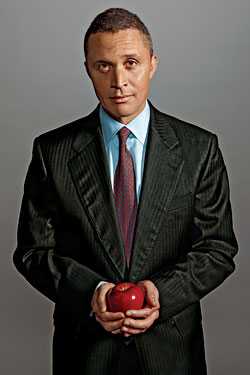
In the long-running political comedy that debuted with Eliot Spitzer’s “Client 9” episode, the unlikeliest act may have been Harold Ford Jr.’s prospective candidacy, which was formally aborted last week but had been in trouble from the moment he admitted to the New York Times that he’d had pedicures and had ’coptered in to Staten Island. Ford’s most natural New York constituency was his breakfast crowd at the Regency, where pedicures are de rigueur. He also has a pronounced Tennessee drawl, not the kind of sound that reassures people in Schenectady.
The notion of Ford’s candidacy was possible, after all, only because of a sense that Kirsten Gillibrand didn’t quite deserve one of the best political jobs in America. A one-term congresswoman, she’d been handed Hillary Clinton’s seat—by David Paterson, no less—and was immediately surrounded by a team of political protectors (Chuck Schumer, Rahm Emanuel) who treated would-be Democratic challengers the way Megan Fox’s bodyguards might handle unwelcome autograph seekers.
Ford’s candidacy was supposed to be an outsider insurgency, with populist overtones. But from the beginning, the logic seemed to be out of Alice in Wonderland. At a moment when America despises Wall Street for helping to wreck the economy, Ford pledged to stand up for the poor little rich guys who populate his social and professional worlds and who felt that Chuck Schumer had been less than supportive and had to be taught a lesson. (“I would support no bill that does harm to New York’s financial industry,” he memorably told The Wall Street Journal—a bracingly frank statement of priorities that assumes either that what’s good for Wall Street would never conflict with what’s good for everyone else, or that it wouldn’t matter to him anyway.) His non–Wall Street supporters included powerful entertainment and media figures. The notion of Ford’s candidacy was, in the words of one Democratic operative, “the revenge of the elites.”
Case in point: A few months ago, recalls a top New York Democratic donor, Ford went to meet some executives at one of the city’s biggest financial institutions. The firm had given generously to the Democrats in recent years, but they were “furious,” says the donor, at the party’s Wall Street bashing. Obama, whom many of them supported, now speaks of “fat-cat bankers” who gobble “obscene” bonuses. And Chuck Schumer supports tighter financial regulations, a financial consumer-protection agency, even limits on executive compensation. Ford impressed the bankers. But their standards weren’t high. “If this guy came down and said nothing but ‘Despite my five terms in Congress, I don’t have any policy views, but I’m going to be independent of Chuck and the White House,’ people would say, ‘That’s a good start!’ ” explains the donor. “The desire [Wall Street] people have just to send a message is really powerful. There are a bunch who don’t want to stand out publicly and say, ‘The White House can go fuck themselves.’ ” Supporting Ford was a way to extend a middle finger “within proper protocol.”
Mort Zuckerman’s even briefer pseudo-candidacy was applauded by essentially the same people for essentially the same reasons—and Ford may have panicked at the support the 72-year-old mogul seemed to be attracting from said elites, even if it was so short-lived that they both bowed out the same day.
You could see how Ford might have been deceived about his prospects. He would be able to raise the money, his wealthy friends assured him. He could count on loads of free publicity from a media that wanted to see a good primary fight, and in which he counts powerful friends (Jon Meacham, Joe Scarborough) and had natural allies. The Times floated Ford’s candidacy (perhaps because, some speculated, Arthur Sulzberger Jr. is workout buddies with Ford supporter Steve Rattner). So did the New York Post, where Gillibrand has not been popular since she assailed the paper for publishing a cartoon last year that some thought likened Barack Obama to a chimp. And Ford had the encouragement of Mayor Bloomberg himself, who considers Gillibrand a poor substitute for his original Senate choice, Caroline Kennedy, and who didn’t dissuade his pollster, Doug Schoen, or his 2009 campaign manager, Bradley Tusk, from advising Ford.
But Michael Bloomberg and Joe Scarborough and Arthur Sulzberger don’t decide Democratic primaries. While much of the city’s elite may call Gillibrand callow and unsenatorial, she had strong support from key elements of the city’s political machine: women and the gay- and abortion-rights activists who couldn’t forgive Ford’s former positioning as a God-fearing social conservative. Besides, the for-it-before-I-was-against-it thing and his high-production-value personal grooming made him an inviting target for satirists.
His race was crucial to his strategy—Ford’s advisers thought he had a chance to win 80 percent of the black vote. But the last insurgent black candidate to take on a white woman in New York, it’s worth noting, was Barack Obama—and he won just 61 percent of the African-American vote against Hillary Clinton in 2008. And Ford was actually running against Obama—not a terribly shrewd way to go about winning a Democratic primary.
Gillibrand now owes Ford a debt of gratitude. While it may have been a stretch to say, as she did last week, that “people have chosen me over him,” she has now been tested for the first time and didn’t crumble.
As for Ford, he proved that with all his brass and sharp-tongued hubris and power suits and extensive grooming rituals and knowledge of the city’s ritziest clubs and restaurants, he is, Tennessee drawl notwithstanding, a New Yorker at his core. And that is something that, eventually, he could build a candidacy on.
Have good intel? Send tips to intel@nymag.com.